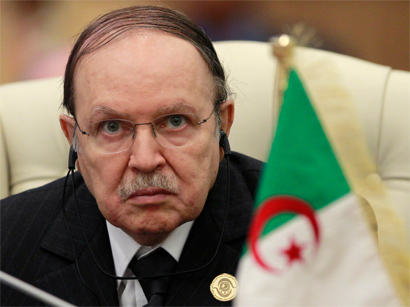Algerian President Abdelaziz Bouteflika has recovered strongly enough from a stroke to govern and will push economic reforms, including loosening restrictions on foreign investors if re-elected this month, campaign spokesman Amara Benyounes said.
Benyounes, who is also Industry and Investment Minister, was campaigning in Paris on Sunday to win support among Algeria's largest disapora ahead of April 17 presidential polls, Reuters reported.
Speaking to Reuters Benyounes dismissed suggestions 77-year-old Bouteflika, who has remained mostly out of the public eye since returning from France after suffering a stroke, would not be fit to rule the country.
"He will manage the country with his head not his feet and his head is working very well," Benyounes said. "We think that President Bouteflika is the best equipped to lead the country in this period of uncertainty and turbulence in the region."
Algeria resisted the upheaval of the Arab Spring in 2011, largely due to the aversion of many Algerians to instability following a civil war in the 1990s between the state and domestic Islamist militants.
With $200 billion in reserves built up from oil and gas exports, state spending on social programs, credits and housing helped ease any unrest. However, the pace of reform has been widely criticized by opponents who see a country mired in corruption, and political and economic stagnation.
"Algeria is not a Banana Republic," Benyounes said. "For a long-time we were considered the most unstable country in North Africa and now we are the most stable power. We do not want to lose that because without stability we can't build anything."
Bouteflika, a hero of the independence war against France, was first elected in 1999, and with the backing of the dominant National Liberation Front(FLN) party, loyal army factions and unions, he is almost assured of a fourth term after 15 years leading the nation.
Benyounes said it was crucial that those for or against Bouteflika took to the polls because a participation rate less than 50 percent would hurt the new president's credibility.
Six opposition parties, including Islamist and secular movements, have announced they will boycott the vote which they say is unfairly tilted in FLN's favour. They remain weak and divided, and no opposition candidate is likely to seriously challenge Bouteflika.
Critics say since its 1962 independence from France, Algerian politics have been dominated by FLN elites and army generals who, while competing behind the scenes for influence, see themselves as guarantors of stability.
Analysts say those political rivalries may resurface if Bouteflika's health fades during a fourth term, though they are unlikely to threaten Algeria's stability.
After decades of state economic controls, Algeria needs reforms to ease restrictions on foreign investment. Energy output, which makes up more than 90 percent of state revenue, is stagnating.
Benyounes said there was a need for an economic stimulus plan to tackle the country's biggest problem - a 25 percent youth unemployment rate - while prioritising investment in the industry, specifically shale gas, and agriculture.
"Shale is important as we have some of the world's biggest reserves. French and American firms are interested," he said.
Benyounes said there had already been some $10 billion invested to support state companies in recent years, and much of that investment had led to partnerships with foreign firms.
Deals highlighting Algeria's opening up included: a contract with Renault to produce cars, pharmaceuticals firm Sanofi setting up a complex near Algiers, or General Electric building several power stations across the country.
"Algeria is regaining trust with big firms. We see these investments as drivers for the future," he said. "But we know that the business climate needs to be improved. A big effort is needed to attract foreign investment and reduce bureaucracy."
Benyounes said several measures would bring a "breath of fresh air" to investors. Among those are the creation of 49 industrial zones providing land for development, easier financing from banks for investors, and the issuance of construction permits in less than a month.
Some 15-20 Algerian private and public sector firms were also being turned into "champions" to channel investment.
"We don't have a [financial] resources problem. It's about getting partnerships with foreign firms as we lack knowledge and technology."






